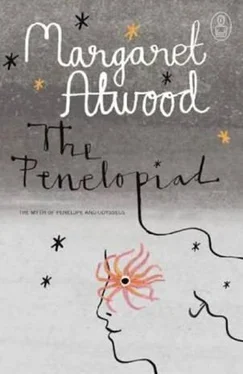But it’s only by peering through such limited keyholes that I’m able to keep track of Odysseus, during those times he’s not down here in his own familiar form.
I suppose you know the rules. If we wish to, we can get ourselves reborn, and have another try at life; but first we have to drink from the Waters of Forgetfulness, so our past lives will be wiped from our memories. Such is the theory; but, like all theories, it’s only a theory. The Waters of Forgetfulness don’t always work the way they’re supposed to. Lots of people remember everything. Some say there’s more than one kind of water that the Waters of Memory are also on tap. I wouldn’t know, myself.
Helen has had more than a few excursions. That’s what she calls them ‘my little excursions’. ‘I’ve been having such fun,’ she’ll begin. Then she’ll detail her latest conquests and fill me in on the changes in fashion. It was through her that I learned about patches, and sunshades, and bustles, and high-heeled shoes, and girdles, and bikinis, and aerobic exercises, and body piercings, and liposuction.
Then she’ll make a speech about how naughty she’s been and how much uproar she’s been causing and how many men she’s ruined. Empires have fallen because of her, she’s fond of saying. ‘I understand the interpretation of the whole Trojan War episode has changed,’ I tell her, to take some of the wind out of her sails. ‘Now they think you were just a myth. It was all about trade routes. That’s what the scholars are saying.
‘Oh, Penelope, you can’t still be jealous,’ she says. ‘Surely we can be friends now! Why don’t you come along with me to the upper world, next time I go? We could do a trip to Las Vegas. Girls’ night out! But I forgot that’s not your style. You’d rather play the faithful little wifey, what with the weaving and so on. Bad me, I could never do it, I’d die of boredom. But you were always such a homebody’
She’s right. I’ll never drink the Waters of Forgetfulness. I can’t see the point of it. No: I can see the point, but I don’t want to take the risk. My past life was fraught with many difficulties, but who’s to say the next one wouldn’t be worse? Even with my limited access I can see that the world is just as dangerous as it was in my day, except that the misery and suffering are on a much wider scale.
As for human nature, it’s as tawdry as ever.
None of this stops Odysseus. He’ll drop in down here for a while, he’ll act pleased to see me, he’ll tell me home life with me was the only thing he ever really wanted, no matter what ravishing beauties he’s been falling into bed with or what wild adventures he’s been having. We’ll take a peaceful stroll, snack on some asphodel, tell the old stories; I’ll hear his news of Telemachus—he’s a Member of Parliament now, I’m so proud!—and then, just when I’m starting to relax, when I’m feeling that I can forgive him for everything he put me through and accept him with all his faults, when I’m starting to believe that this time he really means it, off he goes again, making a beeline for the River Lethe to be born again.
He does mean it. He really does. He wants to be with me. He weeps when he says it. But then some force tears us apart.
It’s the maids. He sees them in the distance, heading our way. They make him nervous. They make him restless. They cause him pain. They make him want to be anywhere and anyone else.
He’s been a French general, he’s been a Mongolian invader, he’s been a tycoon in America, he’s been a headhunter in Borneo. He’s been a film star, an inventor, an advertising man. It always ended badly, with a suicide or an accident or a death in battle or an assassination, and then he’s back her again.
‘Why can’t you leave him alone?’ I yell at the maids. I have to yell because they won’t let me go near them. ‘Surely it’s enough! He did penance, said the prayers, he got himself purified!’
‘It’s not enough for us,’ they call.
‘What more do you want from him?’ I ask them By this time I’m crying. ‘Just tell me!’
But they only run away.
Run isn’t quite accurate. Their legs don’t move. Their still-twitching feet don’t touch the ground.
XXIX. The Chorus Line: We’re Walking Behind A Love Song
Yoo hoo! Mr Nobody! Mr Nameless! Mr Master Illusion! Mr Sleight of Hand, grandson of thief and liars!
We’re here too, the ones without names. other ones without names. The ones with the shame stuck onto us by others. The ones pointed at, the ones fingered.
The chore girls, the bright-cheeked girls, the juicy gigglers, the cheeky young wigglers, the you bloodscrubbers.
Twelve of us. Twelve moon-shaped bums, twelve yummy mouths, twenty-four feather-pillow tits, and best of all, twenty-four twitching feet.
Remember us? Of course you do! We brought water for you to wash your hands, we bathed your feet, we rinsed your laundry, we oiled your shoulders, we laughed at your jokes, we ground your corn, we turned down your cosy bed.
You roped us in, you strung us up, you left us dangling like clothes on a line. What hijinks! What kicks! How virtuous you felt, how righteous, how purified, now that you’d got rid of the plump young dirty dirt-girls inside your head!
You should have buried us properly. You should have poured wine over us. You should have prayed for our forgiveness.
Now you can’t get rid of us, wherever you go: in your life or your afterlife or any of your other lives.
We can see through all your disguises: the paths of day, the paths of darkness, whichever paths you take we’re right behind you, following you like a trail of smoke, like a long tail, a tail made of girls, heavy as memory, light as air: twelve accusations, toes skimming the ground, hands tied behind our backs, tongues sticking out, eyes bulging, songs choked in our throats.
Why did you murder us? What had we done to you that required our deaths? You never answered that.
It was an act of grudging, it was an act of spite, it was an honour killing.
Yoo hoo, Mr Thoughtfulness, Mr Goodness, Mr Godlike, Mr Judge! Look over your shoulder! Here we are, walking behind you, close, close by, close as a kiss, close as your own skin.
We’re the serving girls, we’re here to serve you.
We’re here to serve you right. We’ll never leave you, we’ll stick to you like your shadow, soft and relentless as glue. Pretty maids, all in a row.
we had no voice we had no name we had no choice we had one face one face the same
we took the blame it was not fair but now we’re here we’re all here too the same as you
and now we follow you, we find you now, we call to you to you too wit too woo too wit too woo too woo
The Maids sprout feathers, and fly away as owls.
The main source for The Penelopiad was Homer’s Odyssey , in the Penguin Classics edition, translated by E.V Rieu and revised by D.C.H. Rieu (1991).
Robert Graves’s The Greek Myths (Penguin) was crucial. The information about Penelope’s ancestry, her family relations Helen of Troy was her cousin—and much else, including the stories about her possible infidelity, are to be found there. (See Sections 160 and 171 in particular.) It is to Graves that I owe the theory of Penelope as a possible female-goddess cult leader, though oddly he does not note the significance of the numbers twelve and thirteen in relation to the unfortunate maids.
Graves lists numerous sources for the stories and their variants. These sources include Herodotus, Pausanias, Apollodorus, and Hyginus, among many.
The Homeric Hymns were also helpful—especially in relation to the god Hermes and Lewis Hyde’s Trickster Makes This World threw some light on the character of Odysseus.
Читать дальше












